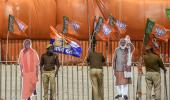'Economic issues do not matter during elections; it is the emotional connect that helps swing votes.'
Rashme Sehgal reports.
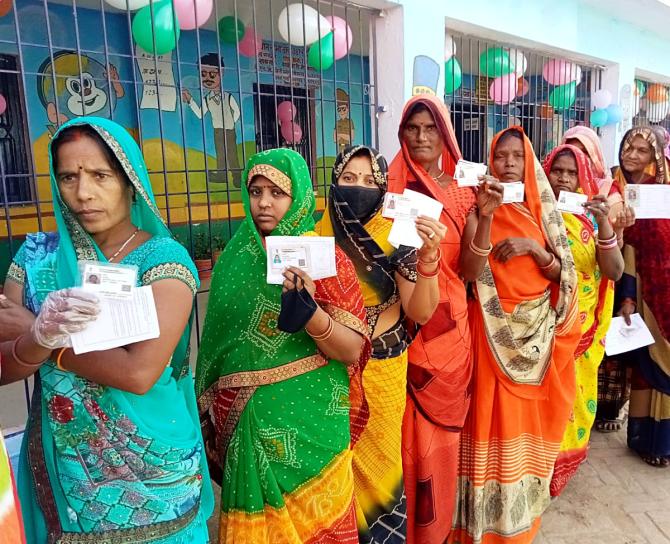
An interesting fact came up in the statistics provided by the Election Commission of India.
It indicated that the turnout of women voters in Uttar Pradesh was, at 63 per cent, higher than the male voter turnout; only 59 per cent of the men had turned up to cast their ballot.
No wonder, this time around, all political parties gave unprecedented attention to women voters.
This is not surprising given that UP has 150 million eligible voters of which 70 million are women.
Though details of district-wise gender voting patterns have yet to be released by the Election Commission, there is little doubt that a large number of women cast their vote in favour of the Modi-Yogi double-engine sarkar.
Prime Minister Modi acknowledged their contribution stating, 'Wherever women voters have voted more than men, BJP has got a bumper victory.'
Congress General Secretary Priyanka Gandhi set the ball rolling at her end by announcing that 40 percent of the party's candidates would be women.
But the Congress campaign proved a non-starter largely because they had no grassroot workers or a committed vote bank to back their candidates.
The result showed that over 90 per cent of the Congress candidates lost their deposits and the party is facing near decimation in UP.
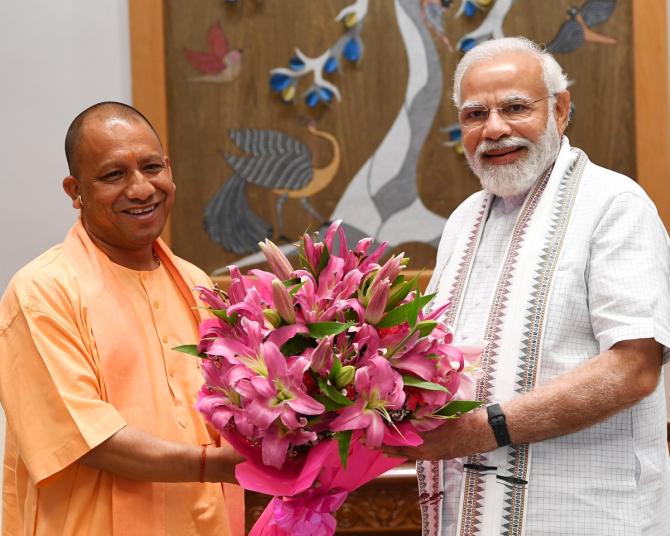
A patriarchal party like the BJP has ostensibly shown concern for the plight of women in Uttar Pradesh and launched a slew of schemes for them even as their key voter constituents have faced the brunt of a meteoric price rise, increasing unemployment and lack of education and health facilities.
To make matters worse, female participation in the workforce -- and especially in the unorganised sector which remains a key source of income for the rural poor -- is inadequate.
Prime Minister Modi is the face of several schemes like the Pradhan Mantri Ujjwala Yojana, which provides LPG cylinders at subsidised prices, and other schemes that provide for the construction of homes, toilets and free rations.
In UP alone, 3 million houses were built under the Pradhan Mantri Awas Yojana of which 2.5 million houses were registered in the names of women.
These schemes, though implemented by earlier governments as well, were repackaged and 'Modified' to such an extent that the public believes they are a direct result of the prime minister's munificence.
Cash transfer schemes to women voters also led to electoral dividends.
On December 21, 2021, Modi announced the transfer of Rs 1,000 crore (Rs 10 billion) into the bank accounts of various self-help groups in UP which were expected to benefit around 1.6 million women. This money, though, still has to reach many of the beneficiaries.
The wives of farmers -- who have received Rs 6,000 annually under the Pradhan Mantri Kisan Samman Nidhi -- say this amount provided much-required assistance during the COVID crisis.
Communist Party of India-Marxist leader Subhashini Ali believes attributing the success of the BJP's welfare measures as the reason for the party's sweep in the state is incorrect.
Ali's own assessment is that "communal polarisation played a key role. Women are as much victims of this propaganda as men are. They believe Hindutva has everything to do with puja-paat and both Modi and Yogi have come to symbolise this sentiment. Why else would Home Minister Amit Shah go from home to home in Kairana (in the state's Shamli district), reminding voters about the Muzzafarnagar riots of 2013? Muslims have been demonised and the public accepts this."
Ali believes the Bahujan Samaj Party factor also played a key role in the BJP's latest win.
"Jatav women were some of (BSP supremo) Mayawati's biggest supporters. Her candidates lost. Their vote share -- which is somewhere between eight to 16 per cent -- also has a large segment of women voters and this went to the BJP," Ali points out.
The analysis by political parties shows that the BSP cut into the Samajwadi Party vote share in 27 constituencies; this included Moradabad Nagar, Meerut South, Aligarh, Pilibhit, Sitapur, Bahraich, Raebareli, Rudauli and Jaunpur.
In some of these constituencies, the BJP candidate won by a tiny margin. In Chhibramau, for example, the SP candidate lost to the BJP candidate by just 0.4 per cent, with the BSP candidate Waheeda Bano getting just 7.81 per cent of the vote.
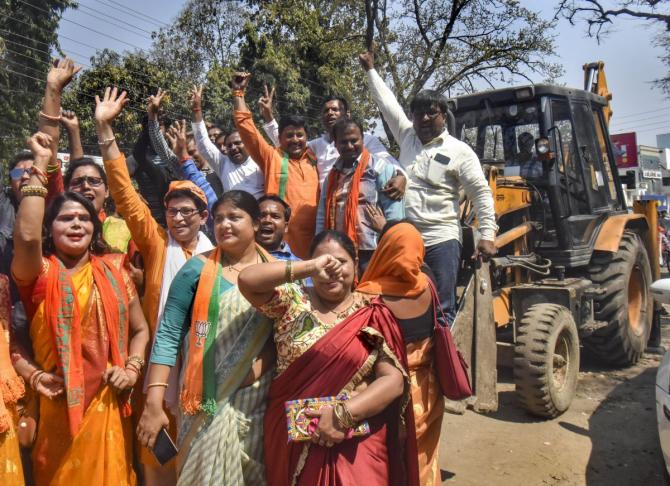
Women and political activists working closely with women in UP believe several undercurrents were at work to ensure women voters voted for the BJP, especially since the Yogi Adityanath-led government's performance was at the bottom of the barrel on most economic indicators.
The Niti Aayog recently ranked UP at the bottom of the all-India multi-dimensional poverty index, warning that the state had 240 million people suffering nutrition deprivation and the situation was worsening due to high levels of maternal and child mortality.
Dr Ranjana Kumari, director, Centre for Social Research, believes that rural India continues to vote in larger numbers as compared to urban India.
"A majority of rural women look upon the elderly unmarried Modi 'as a family elder' who is working for their upliftment. Similarly, Yogi Adityanath is perceived as not being corrupt in personal life. They also believe, contrary to NCRB data, that he has helped improve law and order in the state of UP," says Dr Kumari.
"Economic issues do not matter during elections; it is the emotional connect that helps swing votes," adds Dr Kumari. "The BJP had a host of organisations working for them under different nomenclatures at the grassroot level. No other party was as organised as they were."
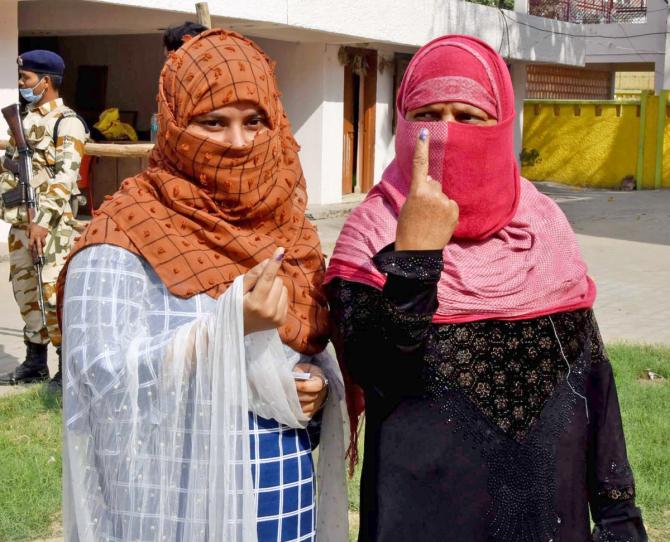
This deep emotional connection can fly in the face of facts and figures that are provided by none other than the government.
UP is known to have the highest crime rate amongst Indian states, with the police recording over 50,000 crimes in 2020, several violent in nature. Yet, women in the state insist 'our Yogi' has helped ensure the security of womenfolk.
Professor Manisha Priyam at the National Institute of Educational Planning and Administration traces the increasing number of women voters to the 2017 state elections, which were impacted by the women-centric welfare schemes that had been introduced in Madhya Pradesh and Bihar.
"This helped weld women into a vote bank in MP and Bihar and UP has followed suit. The policies and politics of women becoming a vote bank has intensified ever since. By 2022, women have emerged as a demand group, specifically in the poorer regions of UP," says Professor Priyam.
Veena Rana, who heads the NGO Dastak in Lucknow, which works with young women, believes other political parties must be able to match the BJP outreach.
"My experience is that a large majority of women continue to have the same political leanings as their husbands. With the Hindutva ideology being accepted by the menfolk, the women too have internalised whatever propaganda is being dished out by the government," says Rao.
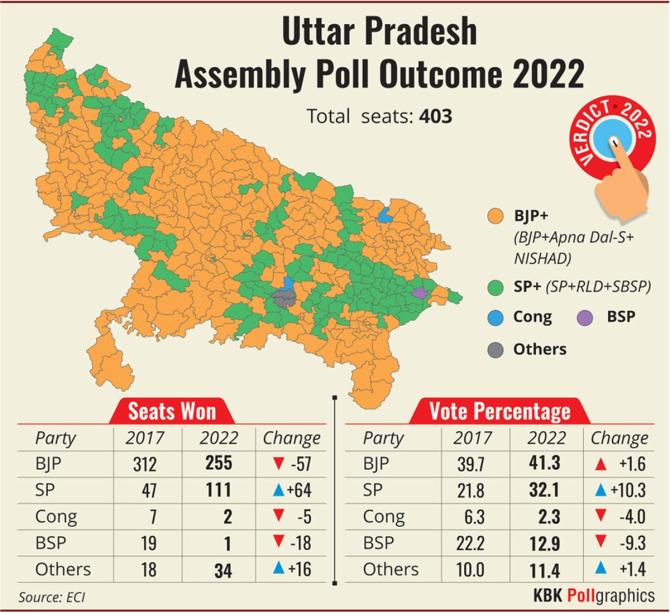
Dr Roop Rekha Verma, the former vice-chancellor of Lucknow University, believes that the BJP has hijacked "our key cultural resources of nationalism and Hinduism and political parties need to come up with a strong and sustainable alternative."
"We are one step away from a Hindu Rashtra and, though the electorate does not understand the implications of this, they are willing to sell even the last shirt on their back to achieve it," says Dr Verma.
"This ideology provides them with a sense of 'Hindu identity' and must be countered by a sustained campaign which focuses on the core values of our Constitution," she adds.
"Instead of questioning the rulers about the shortcomings of a model of governance which has reduced them to their present pathetic state," says Dr Verma, "they have allowed a small clique of people to get away with unprecedented levels of misgovernance.
Feature Presentation: Rajesh Alva/Rediff.com
